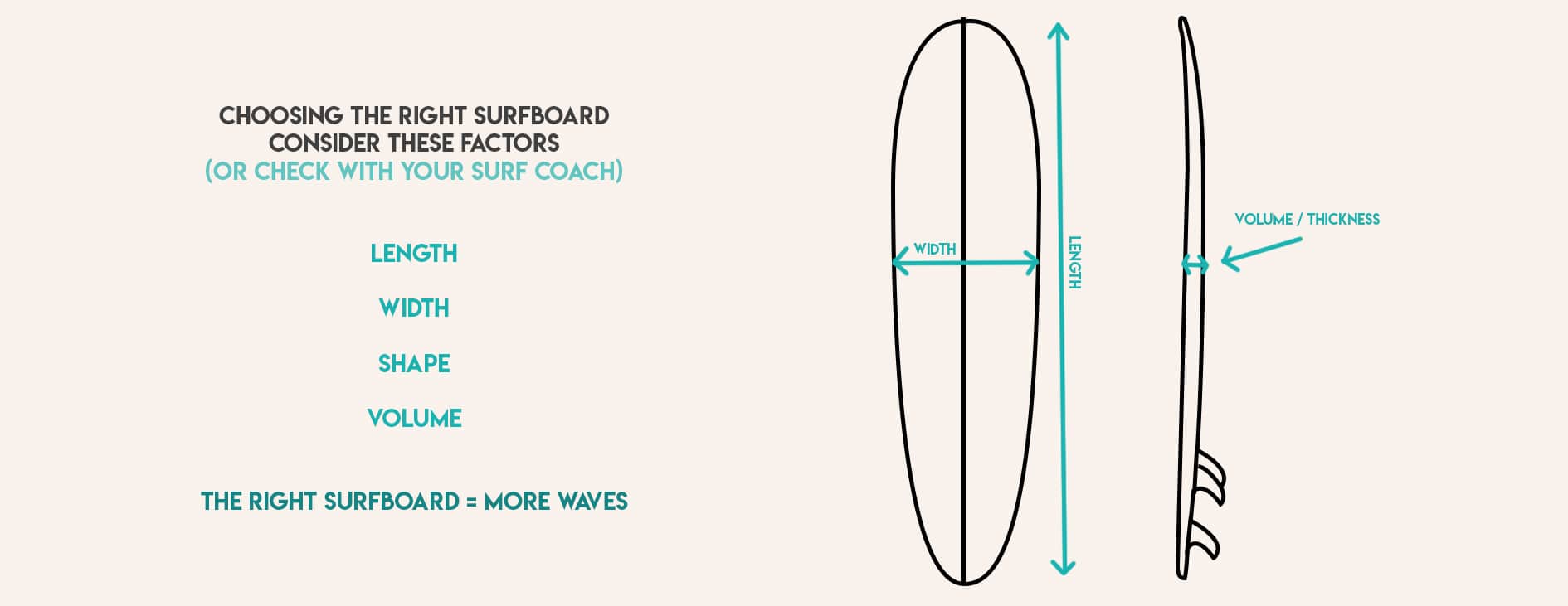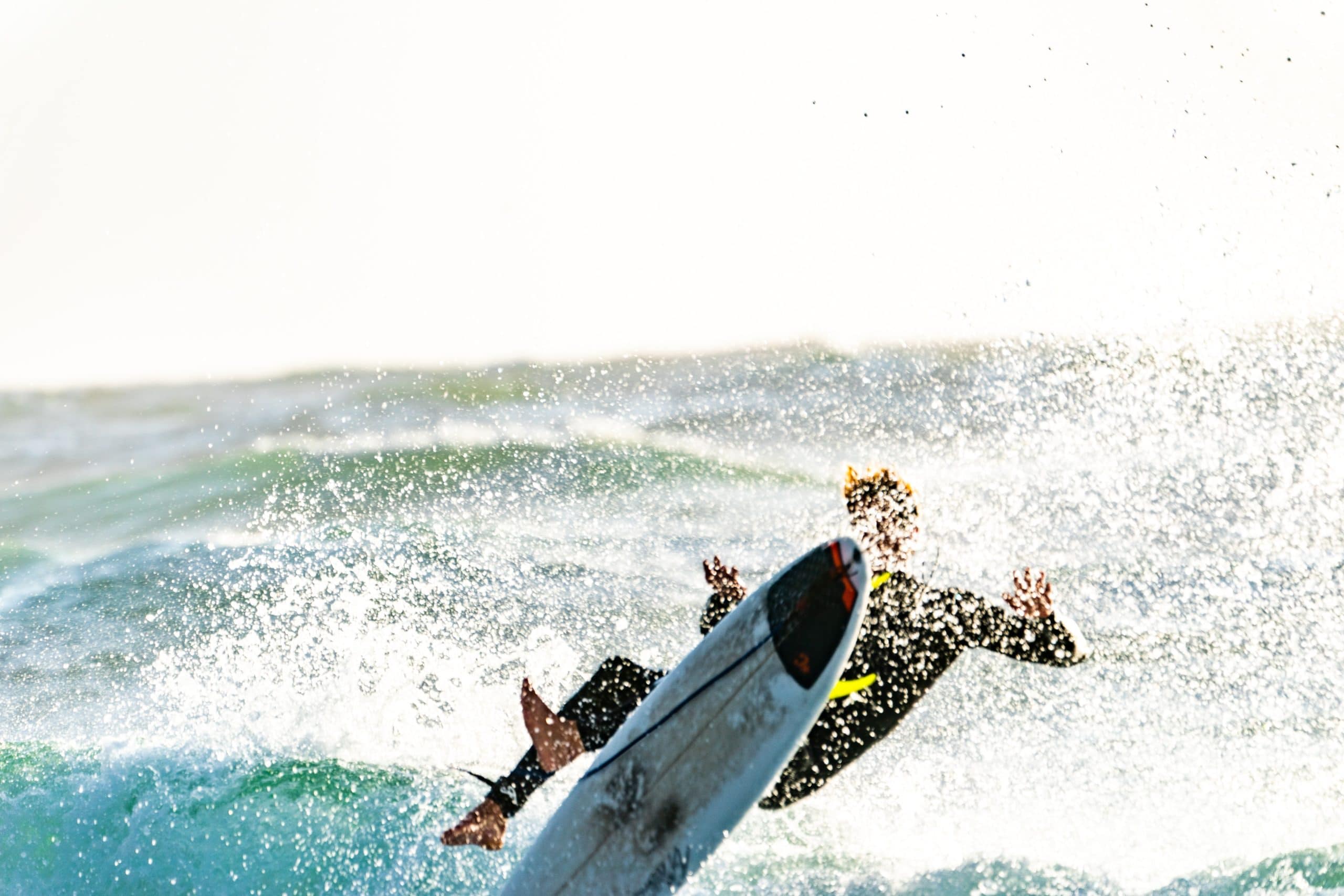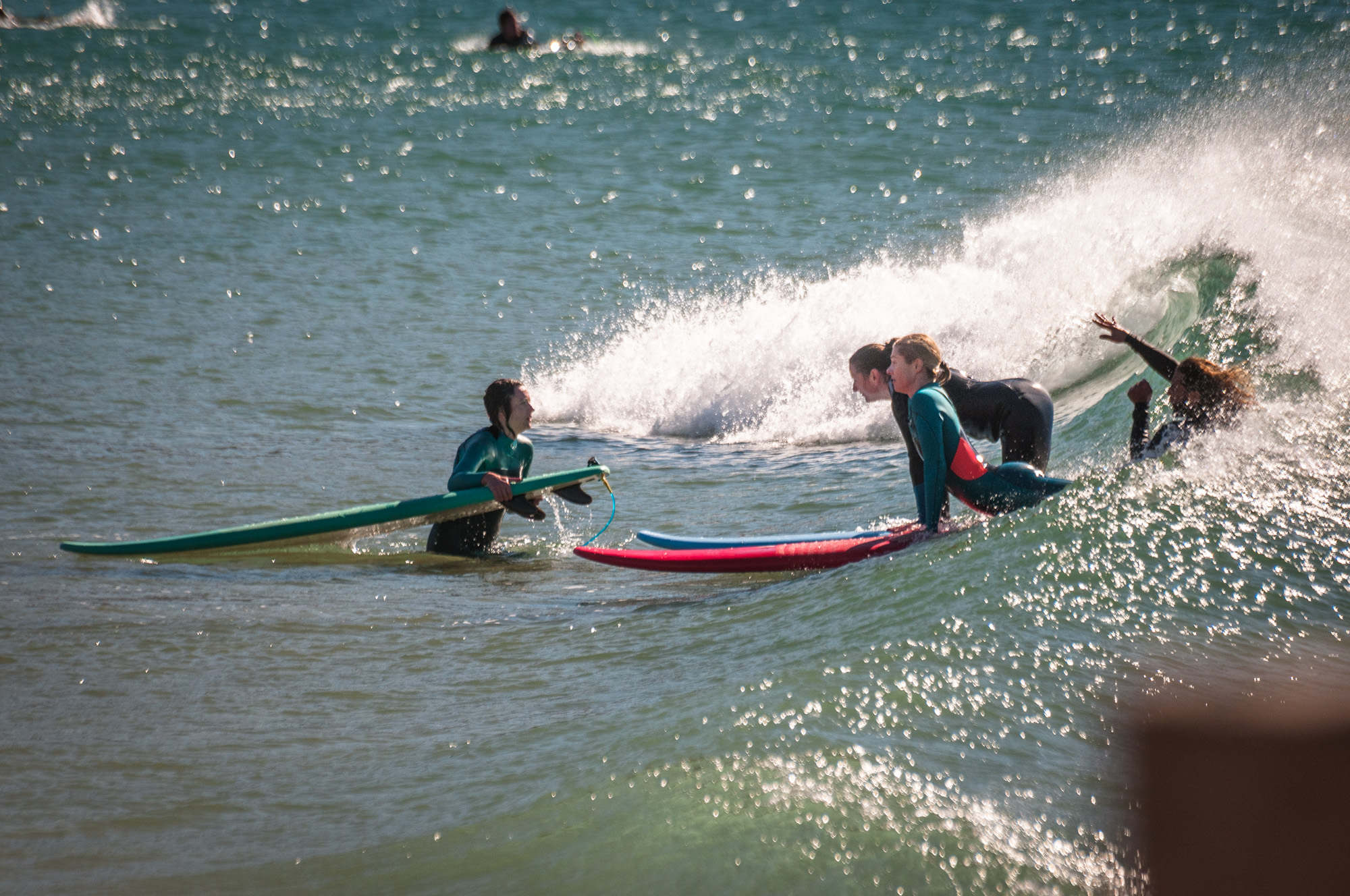Learn to Surf : Beginner Tips
Tip #1 Surfboard Selection
Learn on the right surfboard
Choosing the right surfboard for your level and surf conditions is key to catching more waves. With the correct surfboard you can go from zero to hero. The right board will allow you to catch more waves and enjoy your time in the water. Volume, length, width, thickness and shape all contributed to how easy it will be to get riding the waves. Beginners should start with a longer and wider surfboard with good volume and thickness. Our surf coaches will always choose the best surfboard for your size and level.

Some other key elements; wetsuit, leash and wax.
Depending on the water temperature you may simply need a swimsuit and rash guard but colder the water: the thicker, the wetsuit. In general, Morocco has fairly warm waters but can feel cool if there is wind. Essaouira sea temperatures range 16 to 17°C (61 to 63°F). A good 4/3mm wetsuit will keep you toasty and 2/3mm is sufficient for those who tend not get cold easily. Loving Surf has both on hand for our students. Leashes keep you from losing your board and hurting you or someone else. Wax is an important part of every surfer’s surf kit. Surf wax also is different for each water temperature as well. Check the water temp where you will be surfing before you buy. But we got you covered for Essaouira and Moroccan waves. We carry a selection of wax and will provide for your surf lesson as well.
Tip #2 Choosing the right Surf Spot
and the best surf conditions for your level
- Surf spots and waves are not always consistent. Waves and more importantly safety can also depend on the tides. Some surf spots are better at low tide while others are better at high tide. A beach break is not always the best spot for a beginner and a reef break can be good for beginner surfers. There are more factors that go into choosing the best surf spot than just big or small waves. A good surf coach and surf school will make sure you are going the the best spot and conditions for your level. Loving Surf always makes sure to choose the best surf conditions and surf spots for our students. Our students safety is our main concern and their surf progression is our mission. Knowing the surf spot is key to understanding the best time and place to go, all of our experienced surf instructors are locals and know the area better than anyone. We check the daily and weekly forecast to know when and where to go.
Check the forecast before you suit up to surf:
Tip #3 Safe Surfing means more surfing
Learn to surf safely. Surfing is an extreme sport and the more you progress equals more risks. Know what to do before it happens. Of course knowing how to swim is essential. Taking a surf lesson doesn’t mean you need to be a super strong swimmer but you do need to be comfortable in the water. You must be able to swim in the spot you will surf, you cannot depend on your surfboard as a flotation device, but that said you do not need to be an Olympic swimmer to go surfing. Breathing is key and DON’T PANIC. When you lose to the wave, jump off your surfboard and protect your head. Avoid the impact zone, give distance to other surfers and stay out of the way for surfers catching the waves. Too many times you see beginner surfers paddling right into the line of other surfers, really ruining a good wave but also highly dangerous for both surfers. (cough, Imsouane) Bringing us to the next surf tip… Surf Etiquette.

Tip #4 Surf Etiquette: Just don’t be that surfer
There are major rules to follow in surfing not only for safety but also to be a generally decent person in the water. As beginner surfer, you need to learn these rules to avoid being a ‘“kook” . And really no one wants to be “that guy”. Surfing is a way to share a passion for the water, the waves and something bigger than ourselves. But like anything in life, you are learning so you just don’t know. Here are some major no no’s that you should know before going to surf on your own. DO NOT DROP IN ON SOMEONE ELSE’S WAVE. Not only will it leave you solo outside of the water, it risks serious injury for yourself and the other person. It is just not cool. Learn the lineup and how it works. Ask a more experienced surfer or your surf instructor about following the lineup and how to avoid doing this. This also brings up another tip, give space to other surfers around you. This avoids collisions but also gives an opportunity to share the wave if possible. Next point of safety: DO NOT DITCH YOUR BOARD. If you had given space to those around you, then you run less risk of this. But in crowded surf spots, you just can’t do this. It happens you are in the impact zone and missed doing a turtle roll (we can teach you this), and you need to get under the wave. Always look around you and keep the surfboard under your control. Bringing up next important tip.
Tip #5 Learn how to control your surfboard
Surfboard control is surfing, if you are not control of your board then you are not surfing. It will be you and a flying surfboard as you wipeout and struggle to swim in the waves. Learn how to turtle roll or push through the waves. Hold onto your surfboard as a wave comes and recover your board quickly after you fall. Enter the water with the surfboard perpendicular to the waves to avoid getting a surfboard to the face. And as mentioned, don’t ditch your board. Just don’t do it. Surfboard control is key at all levels of surfing and there will be another post for the next level of surfing to explain.

Tip #6 Pop ups and Paddling
With a surf lesson, the surf instructor will select the right surfboard for you and choose the best surf conditions, teach you the safety aspects and then finally the surf techniques necessary to improving your surf level. You will learn the surf theory for the two major basic skills in surfing; Pop up and Paddling. Without these two surf skills, there is no riding the wave. Mastering your pop up is the fastest way to start riding green waves and bigger waves. Paddling on the other hand gets you out past the break and the trick to catching those waves.
Of course there are always more tips and techniques when you learn to surf, and like learning any sport or skill it takes time, practice and a great teacher! And be gentle with yourself, it is normal you will make mistakes! If you are polite and apologize when needed, you will find the surfers around cheering you on!
Ready to learn to surf and put these tips into practice?
Learn to surf in Morocco with experienced surf coaches at Loving Surf.